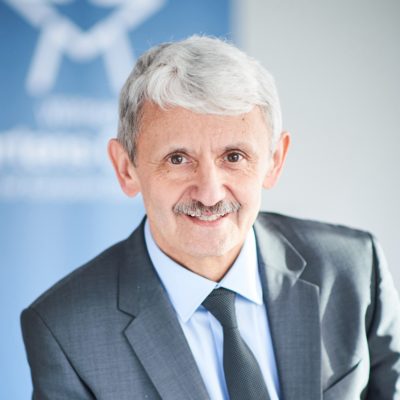Beyond divisions, the only way forward is together
09 May 2020
The month of May is the perfect time for political contemplation. There are many reasons to think deeper about Europe and our European future these days, particularly as we commemorate the 75th anniversary of the end of World War II and 16 years since the reunification of Europe. Additionally, Europe is facing an unparalleled challenge in the post-war era – the COVID-19 pandemic.
If someone asked me these days how Europe is doing, I would have to say that it is divided once again. We somehow overcame the global financial and economic crisis. But the cracks have since only continued to deepen. We were unable to provide a uniform response to the migration crisis. We seem to have lost the ability to distinguish our allies from our opponents, or other potential threats. We are divided when assessing whether government actions are still democratic, or if they already belong to the apparatus of autocrats. We are divided when deciding if the EU enlargement process should continue or be halted. We are divided on the issue of whether the Istanbul Convention is an opportunity or a threat. We are divided on whether our economies, being bled dry by the pandemic, should be rescued by loans or grants, and whether the future European budget should give priority to cohesion and convergence over security and innovation. It has never been easy to reach a consensus within the EU, but the current level of dissonance makes me very concerned.
Whenever there was a problem, I asked myself if anything could be done about it. I asked a similar question recently when reading the interview with Irene Tinagli, Chairwoman of the EP’s Committee on Economic and Monetary Affairs. I learned from the interview that when in her native Italy you mention the European Stability Mechanism (ESM) as a tool to support economic recovery after the coronavirus crisis, “there is a lot of sensitivity”. The ESM is “seen as a traditional instrument, as a way to control economic and fiscal policies.”
In other words, I learned that indebted Italy does not want to take additional loans under the ESM and that the current Italian government instead wants grants. I can understand why a heavily indebted Italy does not want additional loans. But I do not understand why Italian leaders are hiding behind the sentiments of voters while enflaming such views. I do not understand how the leader of a European country can plead for grants, without presenting in advance, or simultaneously, a set of reforms that would change the country for the better.
Having said this, is there anything that can be done to deal with this serious internal European division? In my opinion, we must start playing fair with voters. Either political leaders opt to play fair, or the post-pandemic wave will sweep us away. Political leaders must have the courage to explain to people that cohesion does not mean everyone will enjoy the same income. That solidarity does not mean that people of responsibility will tolerate or promote moral hazard. That someone will have to foot the bill for the irresponsible decisions of politicians. Political leaders must tell EU citizens that the key to Europe’s future consists, first and foremost, of deep reforms implemented at the national level. Only then can the most indebted countries invoke greater solidarity and support from the others. The leaders of EU institutions, for their part, should not raise unrealistic expectations, but rather patiently explain that they can only exercise the competences entrusted to their administration by the member states.
I cannot keep myself from saying this: when we, the post-communist countries, were struggling to get back on our feet after the period of morass, there was no Marshall plan, and we had never heard a term such as ‘bail-out’. It had never even occurred to me, as the then-Prime Minister, to ask other countries for grants to make up for Communist mismanagement. We carried out painful reforms, privatised entire sectors in order to repay old debts and rescue the banks. To this day, ex-Communists reproach me for selling “Slovakia’s family silver”. But I can live with this kind of reproach. Yes, we recognised the value of financial instruments, such as the International Monetary Fund’s stand-by loans, or development investment loans from the World Bank or the European Investment Bank. However, what we always valued most was moral and political support from the West, and its vision of a reunited Europe.
There is no magic wand and the only way forward is together. There is no technical finesse that would us rid of old debts. Individual cunning or political threats are not a solution, either. There is only one thing that will determine our success, or failure – sound leadership by politicians, or their resignation in front of voters disoriented by their actions. Schuman, Adenauer, De Gasperi, their travel companions and their successors achieved a unique feat: uniting Europe and making it stand on its feet. Now is the time for its protection and further development.
ENJOYING THIS CONTENT
